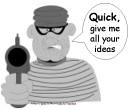 The Thief
The Thief 
Le Voleur is French for the Thief. In 1828, during the birth and rise of the newspaper, Emile de Girardin had a novel idea on how to use the newest writing technology, the printing press. He and a friend decided to start a periodical, but since they lacked capital, the weekly was entitled Le Voleur (The Thief) and it reprinted the best articles that had appeared elsewhere during the week, saving editorial costs. (from ''The History and Power of Writing'')
Friday, March 18, 2005
"At the Gridiron Dinner in Washington on Saturday, where Old Media gently mocked politicians with corny songs, I sat next to a presidential gag writer, Landon Parvin. He was saying jokes work best when Republicans make fun of Republicans and Democrats make fun of Democrats.
President Bush, looking spiffy in white tie and tails, swung by to talk to Mr. Parvin. He didn't look my way, but proceeded back up to the dais.
Suddenly, W. turned around, stopped and looked right at me. Then he flashed a wink, not a flirty wink but a mischievous Clark Gable "I've got your number and you think you've got mine but I win" wink.
Bush had a cold, but he was feeling pretty hot.
He started his presidency with a tentative demeanor and a chip on his shoulder. Now, even with the Middle East still roiling and the Democrats still spoiling for a fight over Social Security, W. feels as if he's won a lot of hands and has a big pile of chips."
President Bush, looking spiffy in white tie and tails, swung by to talk to Mr. Parvin. He didn't look my way, but proceeded back up to the dais.
Suddenly, W. turned around, stopped and looked right at me. Then he flashed a wink, not a flirty wink but a mischievous Clark Gable "I've got your number and you think you've got mine but I win" wink.
Bush had a cold, but he was feeling pretty hot.
He started his presidency with a tentative demeanor and a chip on his shoulder. Now, even with the Middle East still roiling and the Democrats still spoiling for a fight over Social Security, W. feels as if he's won a lot of hands and has a big pile of chips."
Sunday, March 13, 2005
NY Times: "When Grover Norquist, a leading conservative activist, was on the NPR program 'Fresh Air' a while back, he casually made a comparison that left the host, Terry Gross, sputtering in disbelief. 'Excuse me,' she said. 'Did you just ... compare the estate tax with the Holocaust?' Yes, he did.
We are living in the age of the false, and often shameless, analogy. A slick advertising campaign compares the politicians working to dismantle Social Security to Franklin D. Roosevelt. In a new documentary, 'Enron: The Smartest Guys in the Room,' Kenneth Lay compares attacks on his company to the terrorist attacks on the United States.
Intentionally misleading comparisons are becoming the dominant mode of public discourse. The ability to tell true analogies from false ones has never been more important."
We are living in the age of the false, and often shameless, analogy. A slick advertising campaign compares the politicians working to dismantle Social Security to Franklin D. Roosevelt. In a new documentary, 'Enron: The Smartest Guys in the Room,' Kenneth Lay compares attacks on his company to the terrorist attacks on the United States.
Intentionally misleading comparisons are becoming the dominant mode of public discourse. The ability to tell true analogies from false ones has never been more important."
GoogleNews Map
NY Times
Cost of the War in Iraq
(JavaScript Error)

| CURRENT MOON lunar phases |
Play Chess
RSS
Fighting the Good Fight
- Democracy Now!
- Crooks and Liars
- Common Dreams
- Money in Politics
- The Drudge Report
- Corporation Watch
- Noam Chomsky
- Info Wars
- Free Press
- Bill of Rights
- US Constitution
- Z Magazine
- Save the Internet
- Military Industrial Complex
- Stop Illegal Spying









2005-02-13
2005-02-20
2005-02-27
2005-03-06
2005-03-13
2005-03-20
2005-03-27
2005-04-03
2005-04-10
2005-04-17
2005-04-24
2005-05-01
2005-05-15
2005-05-29
2005-06-05
2005-06-19
2005-06-26
2005-07-03
2005-07-10
2005-07-17
2005-07-24
2005-07-31
2005-08-07
2005-08-14
2005-08-21
2005-08-28
2005-09-04
2005-09-11
2005-09-18
2005-09-25
2005-10-02
2005-10-09
2005-10-16
2005-10-23
2005-10-30
2005-11-06
2005-11-13
2005-11-20
2005-11-27
2005-12-04
2005-12-11
2005-12-18
2006-01-01
2006-01-22
2006-02-05
2006-02-19
2006-02-26
2006-03-05
2006-03-12
2006-03-19
2006-03-26
2006-04-09
2006-04-30
2006-05-14
2006-05-21
2006-06-18
2006-06-25
2006-07-02
2006-07-09
2006-07-23
2006-08-06
2006-12-17